BISS Annual Report 2021-22
- Campus Unit: Bias Incident Support Services
- Updated:
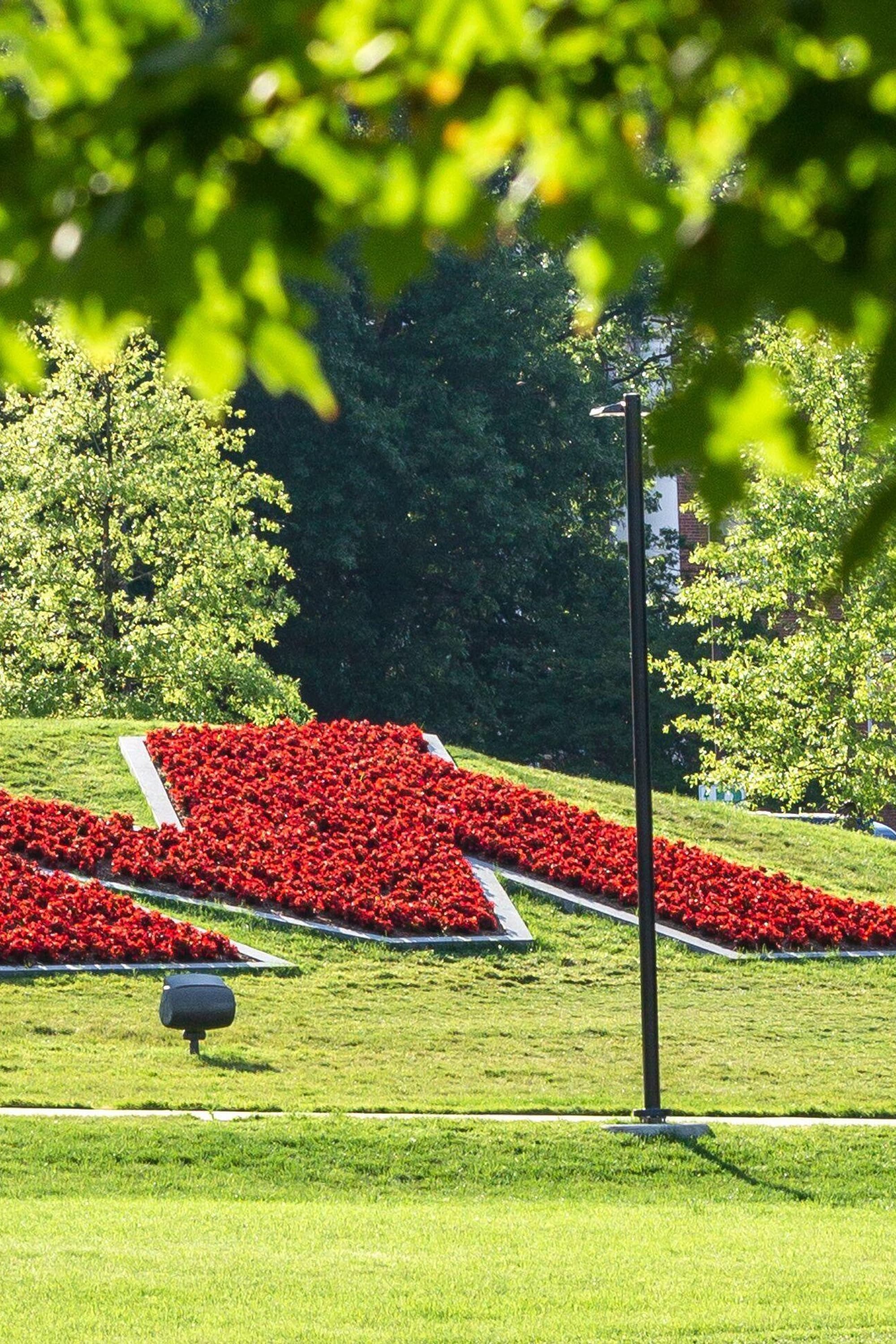
Resource Materials
Introduction
The 2021-2022 academic year continued to present significant challenges. The delta and omicron COVID-19 variants impacted students, staff and faculty in myriad ways. Political turmoil, global climate disruption, a war in Ukraine and several Supreme Court decisions, including overturning 50 years of reproductive health care access and bodily autonomy, caused enormous anxiety and pain for many members in our community.
Bias Incident Support Services (BISS) was and remains a quintessential resource for University of Maryland community members seeking healing after identity-based trauma. Through restorative practices, BISS centers those most marginalized and impacted while simultaneously educating individuals and the broader community around trauma-centered care. BISS partners with campus departments to prevent bias incidents and to mitigate further harm when these situations are reported. BISS and the Hate Bias Response Team will continue to lead individual and collective efforts toward compassionate care.
BISS Staffing
Bias Incident Support Services persisted small but strong with Dr. Van Bailey (director), Brian Medina (program manager) and Alex Franklin (graduate staff). In June 2022, BISS was approved to recruit and hire a graduate assistant for the 2022-2023 academic year. Additionally, the Office of Diversity & Inclusion will be hiring a new administrative coordinator to assist the BISS, TerrapinSTRONG, and ADA Compliance units.
BISS hosted 60 workshops in the 2021-2022 academic year, a marked increase from the 25 workshops provided in 2019-2020. Given the rise in demand over a short period of time, BISS will advocate for greater capacity to meet training and development requests based upon data and trends, including expanding the Stop the Hate training series to engage even more campus partners.
New Initiatives - BISS Visibility Campaign
BISS has received feedback that BISS services were deeply appreciated yet still unknown to much of the University of Maryland community. To address this, Alex Franklin launched the #BISSis visibility campaign in fall 2021, which included flyers, lawn signs and digital displays shared across campus. Alex also created BISS magnets featuring a QR code to the BISS website and report form to share as a giveaway during tabling events. Finally, Alex created an updated BISS brochure to align with our lavender color scheme and provide further insight about BISS to those seeking our services. UMPD and Resident Life have already heard a positive response after distributing many brochures. Alex’s efforts enabled more UMD community members to be aware of what #BISSis. Several campus partners cited this campaign when requesting BISS training and consultation, stating they were grateful to learn that BISS serves all members of the UMD community.
Data and Trends
As evidenced within the year’s BISS by the Numbers report (see below), we observed several trends that deserve further reflection. The shift from mostly online spaces to more in-person interactions has caused a major increase in bias incidents within residence hall and classroom settings. While there remained a fairly high number of online incidents reported (17), they were not nearly to the level of the prior year (93). Whereas the vast majority of bias incidents targeted race/color in 2020-2021, this year there was a broader disbursement of impacted identities, with notable increases in religion, sexual orientation, gender identity or expression, ethnicity, and ability. There were also increased reports of anti-Jewish hate, coinciding with national trends tracked by the Anti-Defamation League. While we provide data regarding reported incidences, it is important to remember that harm cannot easily be conveyed just by the number of reports.
Another trend worth noting is that BISS received no reports of ‘Zoombombing,’ a major win for those securing online video platforms and learning this updated technology over a year.
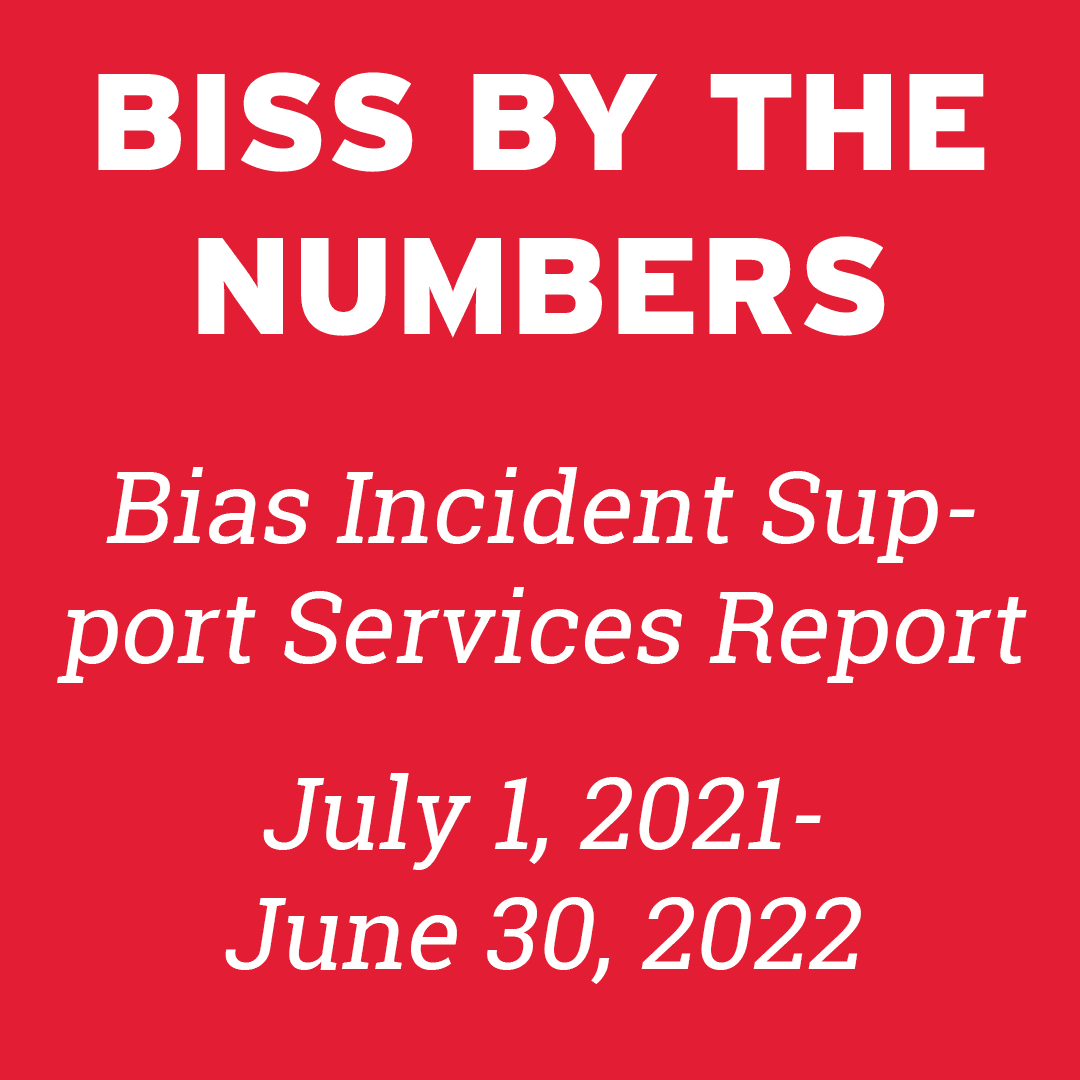
An annual "by the Numbers" summary report from Bias Incident Support Services
Collaborations and Partnerships
A cornerstone of ODI and BISS’ work is our strong partnerships across the University of Maryland. We recognize that to fully incorporate daily equitable practices, we must organize and operate in solidarity with one another, forging sustainable efforts for generations to come.
BISS has cultivated relationships with many schools and colleges and has advised their internal teams around complex cultural challenges that go far beyond an individual bias incident. Over the past year, BISS has strengthened partnerships with the College of Education; School of Public Health; School of Public Policy; Smith School of Business; School of Architecture, Preservation, and Planning; School of Music; and Department of Psychology. Each of these has included BISS’s training workshops and consultations to mitigate bias and power dynamics as part of their programming. Several have also created faculty teams to liaise with BISS throughout the year. These teams communicate concerns and share observations about their areas with BISS and learn from BISS about trauma-centered practices in hopes of preventing future harm. Additionally, BISS continues to be a leader nationally; other institutions across the country continue to seek out consultation and expertise regarding processes, protocol, and campus climate.
BISS continues to serve on the Conflict Resolvers Network, a campus group dedicated to navigating institutional barriers and addressing community member challenges that require delicate and coordinated responses. BISS also participates within the campus-wide Free Expression workgroup, managed by Stamp director Marsha Guenzler-Stevens, to advise the campus toward effective prevention and response techniques related to activism and campus-wide events.
The Hate Bias Response Team gathered biweekly throughout the calendar year to review individual cases, observe trends and make recommendations toward training, programs and community support spaces. The team is composed of representatives from the Counseling Center, Resident Life, Student Conduct, Office of Civil Rights & Sexual Misconduct and University of Maryland Police Department. This team also educates their respective departments about campus trends and changes to state law that may impact their work.
The Hate Bias Student Advisory Group met monthly throughout the academic year and engaged students in both programmatic and training opportunities as co-facilitators. Several members expressed how much their participation enabled them to guide their student groups, faculty and broader community relationships to better understand the nuances of hate-bias and of BISS services in particular. We would like to thank and highlight Astrid Widjaja who offered to amplify BISS to the Division of Student Affairs through this video: Get to Know Bias Incident Support Services (BISS).
Programs
BISS furthered its ongoing series of panels dedicated to exploring the intersections and conflicts between free speech and social justice. This year we offered a student panel (October 2021) and panel of internal & external experts (April 2022) discussing effective activism strategies. Over 100 registrants attended one or both of these panels.
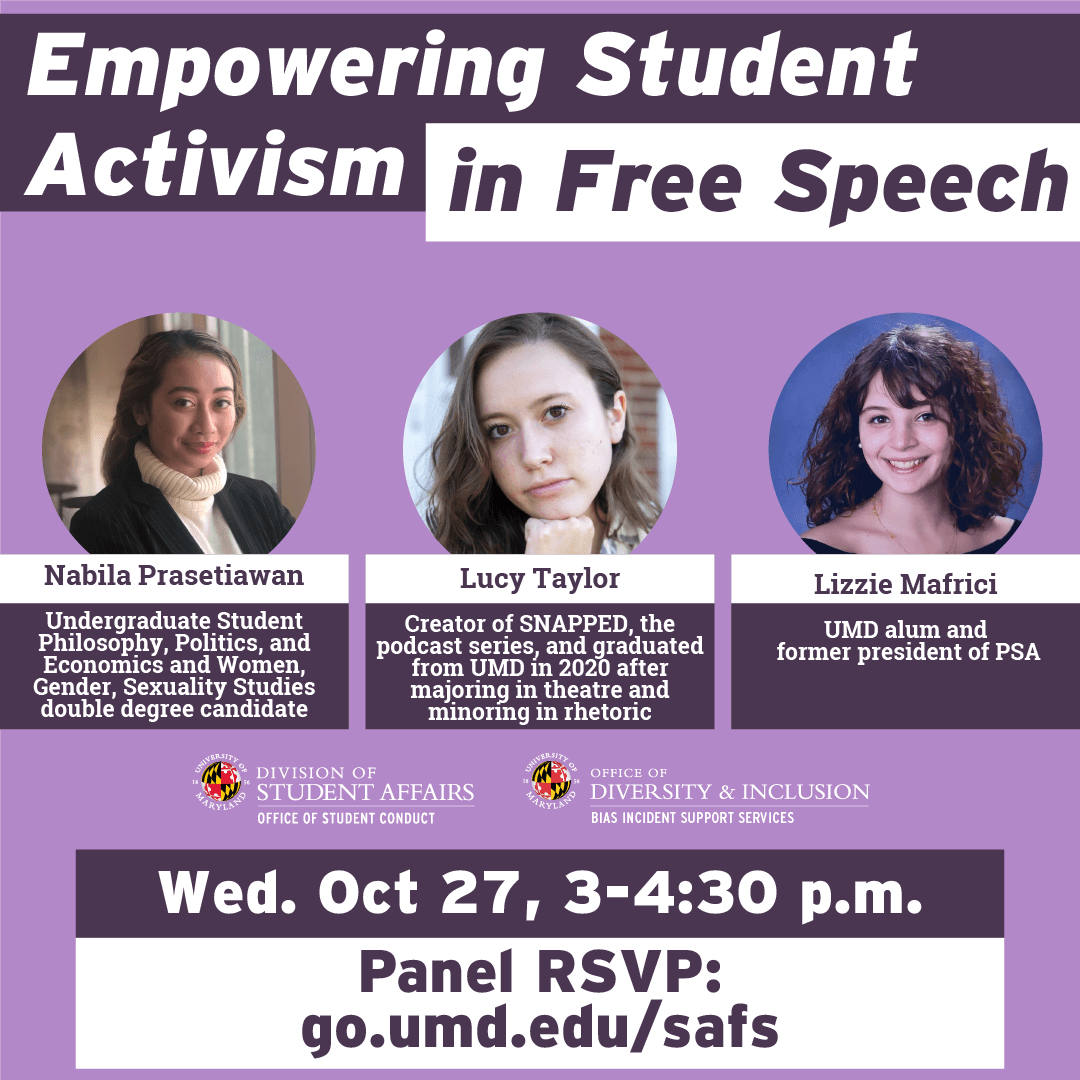
A student panel on how activism can empower student voices and experiences
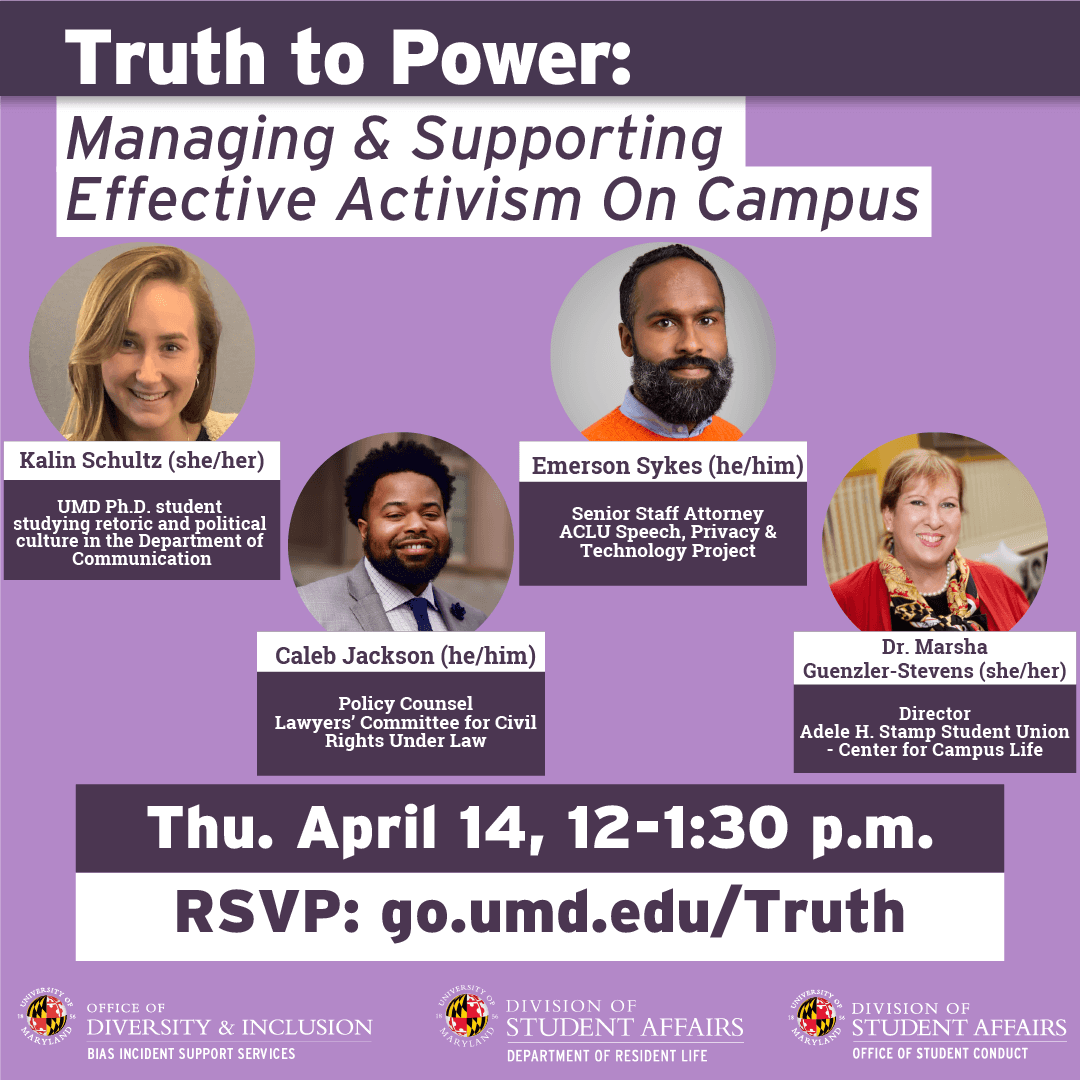
Truth To Power: Managing and Supporting Effective Activism on Campus
Campus Unit: Bias Incident Support Services
Panelists from UMD, the ACLU and the Lawyers' Committee for Civil Rights Under Law discuss campus activism
BISS regularly infuses restorative practices into individual and group interactions. Sometimes, this looks like intentional check-ins within team meetings; sometimes, BISS facilitates responsive circles or discussions after identity-based trauma. Whether preventing harm or addressing particular incidents, BISS endeavors to hold compassionate and caring space for those who need it.
For the monthly Circle series, BISS hosted restorative spaces for Jewish community members, veterans, folx with disabilities, and those deeply impacted by the ongoing COVID-19 pandemic.
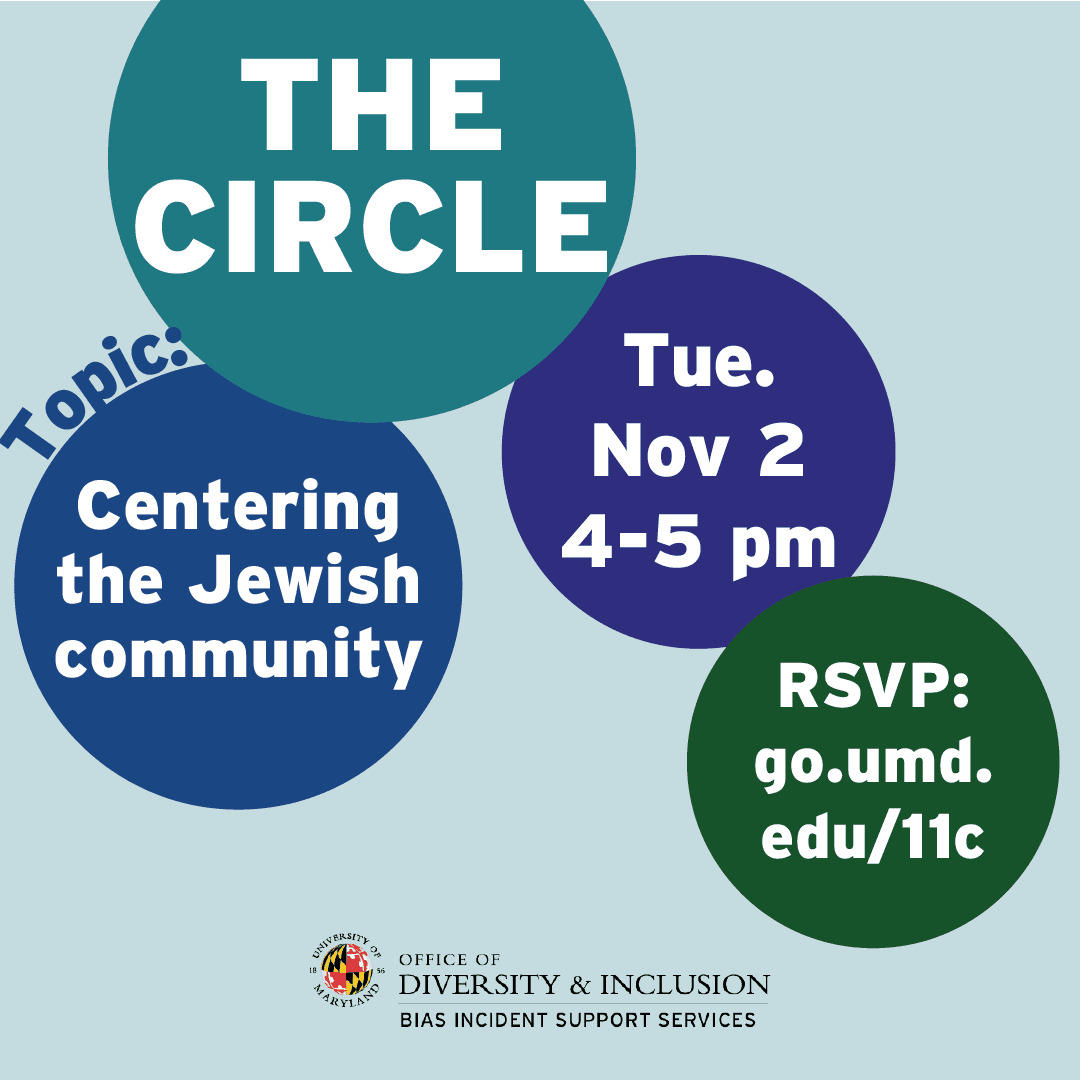
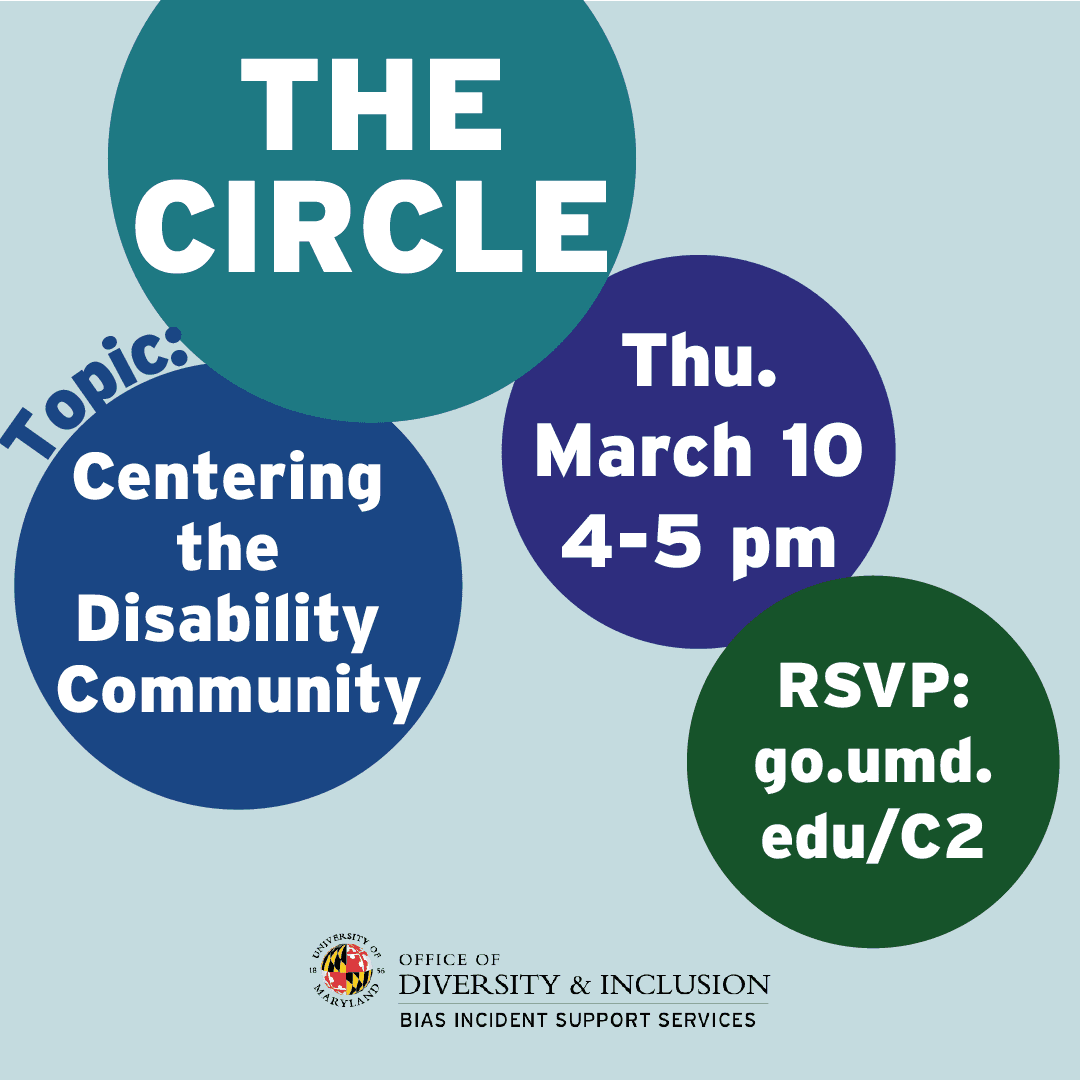
Trainings
BISS facilitated eight campus-wide Stop the Hate training sessions throughout the year, with over 500 registrants in total. Half of these sessions were focused on student engagement whereas the other half provided scenarios most relevant for faculty and/or staff members at UMD. The feedback was overwhelmingly positive; one attendee called it “one of the best university training sessions I have attended.” Ninety-eight percent of participant respondents indicated that a Stop the Hate training enhanced their knowledge of bias incident reporting and response!
In collaboration with the Diversity Training & Education unit and the Meyerhoff Center for Jewish Studies, BISS co-hosted a series of panel discussions related to Jewish identities and the history of antisemitism. Over 200 registrants attended a total of four panel discussions.
As stated previously, more and more departments have sought consultation and training from BISS in order to address bias incidents or historical oppression of marginalized populations across campus. We anticipate the need for specialized staff who focus on both proactive and reactive training curricula to advance current offerings.
Conclusion
The University of Maryland has advanced several important initiatives to align with its values of diversity, equity and inclusion: the TerrapinSTRONG initiative, changes to the General Education diversity requirement and newly named buildings such as Yahentamitsi dining hall and Johnson-Whittle and Pyon-Chen residence halls. However, the push-pull dynamic of progress often means that those with privilege see these historic changes as threatening their long-held monopoly on power and access.
The prevalence of bias and bigotry remains constant and continues to disproportionately harm marginalized communities. BISS affirms the dignity and humanity of those who report bias incidents, acknowledging that it is just one step along their healing journey. In order to prevent future harm, the larger university must initiate radical changes so that healing can transition to justice and liberation. BISS will continue to center those impacted by identity-based trauma, utilizing nonviolent communication as we advocate for sustained, systemic transformation that improves the lives and livelihood of those we serve.
Topics
Type
Campus Unit